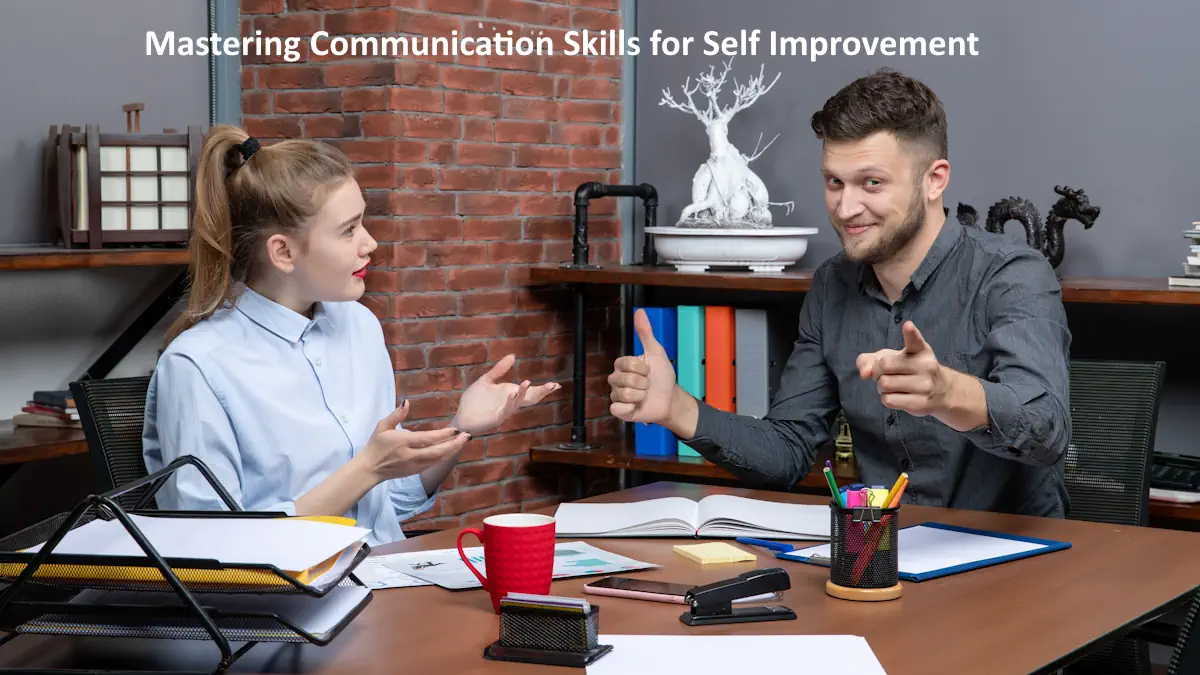Table of contents
- The Link Between Self Improvement and Relationship Success
- Understanding the Basics of Effective Communication
- Improving Communication Through Self Improvement
- Active Listening: A Vital Communication Skill
- Building Emotional Intelligence for Better Communication
- Practicing Empathy for Stronger Connections
- Effective Communication Techniques for Self Improvement
- Overcoming Communication Barriers for Stronger Relationships
- FAQs
- Conclusion
Building strong, happy relationships requires more than just love and commitment. It also takes solid communication skills to nurture trust, empathy, and understanding. In today’s fast-paced world, achieving better communication in relationships is crucial not only for lasting bonds but also for personal self improvement. By understanding how to effectively communicate, you can reduce misunderstandings, deepen connections, and ultimately boost happiness.
This article will explore practical techniques to improve communication, build stronger relationships, and foster meaningful self improvement. Embracing these skills will lead you toward a happier, more fulfilling life—both in your personal relationships and within yourself.
The Link Between Self Improvement and Relationship Success
The journey to better relationships often begins with self improvement. When you focus on personal growth, you gain the confidence, patience, and empathy needed to connect with others. Self improvement in relationships involves enhancing emotional intelligence, building empathy, and learning to listen deeply. This personal development empowers you to communicate more effectively, which positively impacts every relationship in your life.
By committing to self improvement, you’re not only becoming a better partner, friend, or family member but also transforming into a more fulfilled and self-aware individual. The desire to better yourself strengthens your relationships and encourages growth, honesty, and love in your interactions with others.
Understanding the Basics of Effective Communication
Communication is more than just exchanging words. It involves truly understanding what the other person is saying and ensuring they understand you. Effective communication is the backbone of any relationship, allowing you to build trust, resolve conflicts, and express needs clearly. Here are some basics:
- Active Listening: Listening is often undervalued, yet it’s essential. Focus on understanding the other person’s feelings and viewpoints.
- Nonverbal Cues: Body language, eye contact, and tone of voice play significant roles. They often convey more than words.
- Clarity and Directness: Be clear about your thoughts and feelings, and avoid ambiguous language.
- Empathy: Try to see things from the other person’s perspective. Empathy is a cornerstone of strong communication and helps to create deeper understanding.
Mastering these basics can help you build a strong foundation in communication, setting the stage for long-term relationship success.
Improving Communication Through Self Improvement
Self improvement goes hand-in-hand with communication skills. When you work on developing yourself, you naturally become better at expressing your thoughts, managing emotions, and understanding others. This personal growth enhances your ability to navigate relationships with ease. Here’s how self improvement can elevate your communication skills:
- Building Confidence: When you’re confident, you communicate more clearly and assertively. Self-improvement boosts self-esteem, allowing you to express yourself openly without fear of judgment.
- Emotional Regulation: Managing your emotions is crucial. Self improvement helps you recognize and control your emotions, reducing the chances of reactive responses that can lead to conflict.
- Increasing Empathy: Personal growth allows you to be more empathetic, a key component in effective communication. Empathy enables you to connect with others on a deeper level, understanding their feelings and perspectives.
When you invest in self improvement, you’re not just making yourself better—you’re also enhancing the quality of your relationships by being a more compassionate and understanding partner, friend, or family member.
The Role of Self Improvement in Handling Conflict
Conflict is a natural part of any relationship, but the way you handle it can make all the difference. Self improvement helps you manage conflict more constructively. By developing patience, emotional intelligence, and resilience, you become more equipped to approach disagreements with a clear mind and a calm heart.
- Mindfulness Practices: Techniques such as deep breathing and mindfulness can help you stay calm in difficult situations.
- Open Dialogue: Self improvement encourages honest, open discussions, which can prevent misunderstandings.
- Compromise and Understanding: Personal growth makes it easier to prioritize harmony over winning an argument.
Handling conflict in a constructive way not only strengthens your relationships but also contributes to your self improvement, fostering maturity and emotional balance.
Active Listening: A Vital Communication Skill
Active listening is one of the most powerful communication tools. It’s about listening to understand rather than to respond. When you practice active listening, you make the other person feel valued and understood. This approach can transform relationships, helping you build trust and reduce misunderstandings. To become an active listener:
- Maintain Eye Contact: Show that you’re engaged.
- Avoid Interrupting: Allow the other person to speak without cutting them off.
- Reflect Back: Repeat what you’ve heard in your own words to confirm understanding.
- Show Empathy: Recognize the emotions behind their words, validating their feelings.
Building Emotional Intelligence for Better Communication
Active listening doesn’t just improve communication; it also fosters self improvement by teaching you patience and empathy, qualities that enrich every relationship.
Emotional intelligence (EQ) is the ability to understand and manage your own emotions and those of others. High EQ is crucial for effective communication, as it helps you navigate emotions and reactions with greater sensitivity. By improving your emotional intelligence, you’ll be better equipped to handle conversations, respond to emotional cues, and avoid conflicts.
- Self-Awareness: Recognize your emotional triggers and manage reactions.
- Self-Regulation: Practice calming techniques to control impulsive reactions.
- Empathy: Make an effort to understand others’ feelings and perspectives.
- Social Skills: Strengthen your social skills, including teamwork and conflict resolution.
Investing in your emotional intelligence through self improvement can lead to healthier, more resilient relationships. When you’re emotionally intelligent, you’re better able to communicate, understand, and support others, building deeper connections.
Practicing Empathy for Stronger Connections
Empathy is the ability to understand and share the feelings of others. Practicing empathy helps create a safe space in relationships, where both individuals feel heard, respected, and valued. Empathy encourages open communication and minimizes the risk of misunderstandings. Here’s how to build empathy in your relationships:
- Listen Without Judging: Let others express themselves without criticism.
- Put Yourself in Their Shoes: Try to understand their perspective, even if it’s different from your own.
- Show Compassion: Be gentle and considerate in your responses.
Empathy not only strengthens relationships but also encourages self improvement. By practicing empathy, you become more aware of your own emotional responses, creating a deeper understanding of yourself and others.
Effective Communication Techniques for Self Improvement
Incorporating effective communication techniques into your self improvement journey can lead to amazing results. These techniques not only improve relationships but also help you grow as an individual. By mastering these skills, you enhance your ability to connect with others and achieve greater personal satisfaction.
- Use “I” Statements: Instead of saying “You always…” try “I feel…”. This reduces defensiveness and encourages open dialogue.
- Be Assertive, Not Aggressive: Express your feelings and needs confidently without overpowering others.
- Practice Patience: Take your time in responding, especially during conflicts, to ensure a calm and thoughtful reply.
These techniques encourage a healthy balance between expressing yourself and respecting others’ viewpoints, leading to both self improvement and stronger, more fulfilling relationships.
How Self Improvement Enhances Assertiveness
Assertiveness is a vital communication skill that involves expressing yourself openly while respecting others. It’s different from aggression, as it doesn’t involve overpowering someone. Self improvement plays a big role in building assertiveness, helping you develop confidence and clarity.
- Self-Respect: Self improvement helps you recognize your value, making it easier to communicate assertively.
- Setting Boundaries: Learn to communicate your limits without guilt.
- Clear Communication: Self improvement encourages clear, honest communication, essential for assertiveness.
By developing assertiveness through self improvement, you enhance your ability to communicate effectively, fostering mutual respect and understanding in relationships.
Overcoming Communication Barriers for Stronger Relationships
Communication barriers, such as misunderstandings, assumptions, or language differences, can hinder relationships. Recognizing and overcoming these barriers is essential for building meaningful connections. Here’s how:
- Clarify Assumptions: If unsure, ask rather than assume.
- Practice Patience: Slow down and give others time to express themselves.
- Adapt Your Style: Be flexible in your approach, adjusting to different personalities and situations.
Breaking down these barriers requires self improvement, as it involves patience, empathy, and understanding. By overcoming these barriers, you can communicate more effectively and form closer, more authentic relationships.
FAQs
Why is self improvement important in relationships?
Self improvement fosters qualities like empathy, patience, and emotional intelligence, essential for healthy, fulfilling relationships.
How does active listening improve communication?
Active listening allows you to understand others deeply, reducing misunderstandings and building trust.
What is the role of emotional intelligence in communication?
Emotional intelligence helps you manage emotions, respond appropriately, and empathize with others, enhancing communication.
How can I handle conflict better in relationships?
Through self improvement techniques, such as mindfulness and open dialogue, you can approach conflicts with calmness and understanding.
Why is empathy crucial for strong relationships?
Empathy allows you to connect on a deeper level, creating a safe space for honest communication and understanding.
Conclusion
Mastering communication skills is essential for building happy, lasting relationships. When you commit to self improvement, you unlock the potential for deeper connections and greater understanding. From active listening and emotional intelligence to assertiveness and empathy, each skill brings you closer to building fulfilling relationships. Embrace the journey of personal growth, as it will transform not only your relationships but also your overall happiness and well-being.













2 thoughts on “Boost Your Happiness: Mastering Communication for Better Bonds”